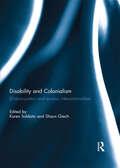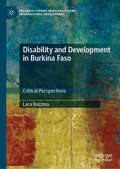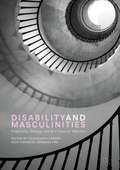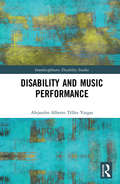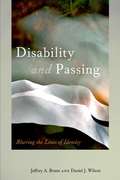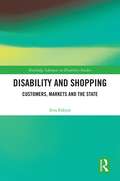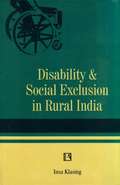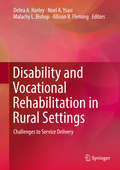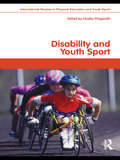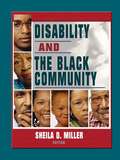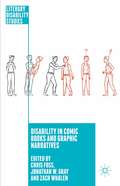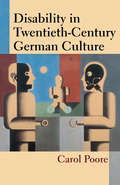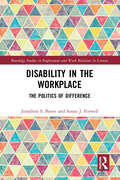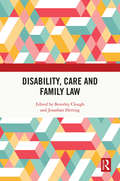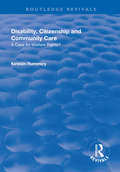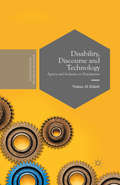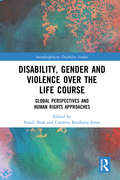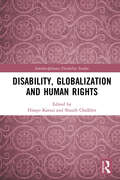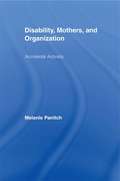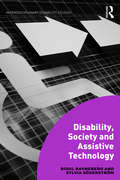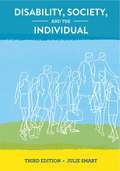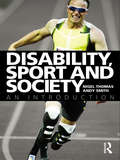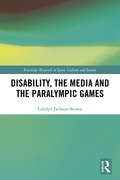- Table View
- List View
Disability and Colonialism: (Dis)encounters and Anxious Intersectionalities
by Karen Soldatic and Shaun GrechThe mapping, control and subjugation of the human body and mind were core features of the colonial conquest. This book draws together a rich collection of diverse, yet rigorous, papers that aim to expose the presence and significance of disability within colonialism, and how disability remains present in the establishment, maintenance and continuation of colonial structures of power. Disability as a site of historical analysis has become critically important to understanding colonial relations of power and the ways in which gender and identity are defined through colonial categorisations of the body. Thus, there is a growing prominence of disability within the historical literature. Yet, there are few international anthologies that traverse a critical level of depth on the subject domain. This book fills a critical gap in the historical literature and is likely to become a core reader for post graduate studies within disability studies, postcolonial studies and more broadly across the humanities. The chapters in this book were originally published as articles in Social Identities: Journal for the Study of Race, Nation and Culture.
Disability and Development in Burkina Faso: Critical Perspectives (Palgrave Studies in Disability and International Development)
by Lara BezzinaThis book builds upon critiques of development in the disability domain by investigating the necessity and implications of theorising disability from the Global South and how development policies and practices pertaining to disabled people in such contexts might be improved by engaging with their voices and agency. The author focuses on the lived experiences of disabled people in Burkina Faso, while situating these experiences, where necessary, in the wider national and regional contexts. She explores development agencies’ interventions with disabled people and the need to re-think these practices and ideologies which are often framed within western contexts. This work will appeal to policy makers, NGOs, academics, students and researchers in the fields of development and disability studies.
Disability and Discourse
by Val WilliamsDisability and Discourse applies and explains Conversation Analysis (CA), an established methodology for studying communication, to explore what happens during the everyday encounters of people with intellectual disabilities and the other people with whom they interact.Explores conversations and encounters from the lives of people with intellectual disabilitiesIntroduces the established methodology of Conversation Analysis, making it accessible and useful to a wide range of students, researchers and practitionersAdopts a discursive approach which looks at how people with intellectual disabilities use talk in real-life situations, while showing how such talk can be supported and developedFollows people into the meetings and discussions that take place in self-advocacy and research contextsOffers insights into how people with learning disabilities can have a voice in their own affairs, in policy-making, and in research
Disability and Masculinities
by Barbara Pini Cassandra Loeser Vicki CrowleyIn recent years, attending to diversity in the cultivation of embodied identity has been given additional impetus as a result of intersectionality theory. Despite this, a key gap remains in terms of knowledge about masculinity and disability. This book addresses this lacuna through ten empirical chapters organised through the inter-related themes of corporeality, pedagogy and the critique of otherness. Each of the chapters positions the subject of masculinity and disability as a site of cultural pedagogy by affirming different ways of knowing of masculinity beyond dominant ideologies that normalise a particular masculine body and relegate disabled masculinities to the position of abnormal 'Other'. Part One focuses on pedagogy. Through the materialities of 'medicalized colonialism', imprimaturs of 'relational genealogies', 'compounding differences' and an analytical exposition of some of the neo-colonial conditions of the Global South within spatially-considered places of the Global North, Chapter 1 examines the denial of human rights to the Indigenous Anishinaabe community of Shoal Lake 40 in Canada. Chapter 1 theorises masculine corporeality in terms that take seriously First Nations', national and transnational body politics seriously. Chapter 2 examines the ways that movement and affect serve as a form of pedagogy for boys with autism spectrum in schools. Part Two's focus on corporeality includes an examination of the nexus of disability and diagnosis in the context of transgender men's experiences of mental health, and a discussion of the ways that intersex individuals who identify as men and have experienced 'genital normalising surgery' actively negotiate pluralised masculinities. The focus on media in Part Three encompasses a study of the mis-interpellation of the disabled male subject in Australian male literature, research on the discursive strategies utilised in media representations of disabled veterans in Turkey, and an analysis of the political implications of depictions of masculinity, disability and sexualities in a variety television program. Part Four's theme of self-stylisation takes up the questions of men's reconstructions of masculinity in light of Lyme Disease, the potential pleasures of heterosexuality for young men with a hearing disability in the realm of Australian-Rules Football, and the diverse ways that disabled men negotiate patriarchal masculinity in intimate relationships.
Disability and Music Performance (Interdisciplinary Disability Studies)
by Alejandro Alberto Téllez VargasDisability and Music Performance examines discriminatory social practices in music conservatoria, orchestras, music festivals and music competitions, which limit disabled people’s access to music performance at a professional level. Of particular interest are the disabling barriers that musicians with an intellectual, physical, sensory or neurological disability—or an acquired brain injury—encounter in the world of Western classical music, both as students and as professional performers. This book collects data in the form of semi-structured interviews and video and audio recordings to explore the voice, concerns and suggestions expressed by musicians with disabilities. It examines their perceptions of both inclusive and discriminatory practices in music institutions as well as the representation of, and audio-visual recordings by, key musical figures with disabilities. Its findings aim to contribute to the wellbeing of musicians with impairments by challenging disabling social practices that see them as inferior. This publication offers performers, teachers and researchers new perspectives for exploring some of the most common social dynamics in encounters between normative audiences, musicians and music critics, and musicians with disabilities. It invites the reader to recognise disability as a rightful identity category in music performance and to dismantle the disabling barriers that limit the participation of disabled people in music-making.
Disability and Passing: Blurring the Lines of Identity
by Wilson Brune Jeffrey A. Daniel J.Why passing is a crucial concept in disability studies
Disability and Passing: Blurring the Lines of Identity
by Jeffrey A. Brune Daniel J. WilsonPassing--an act usually associated with disguising race --also relates to disability. Whether a person with a psychiatric disorder struggles to suppress aberrant behaviour to appear "normal" or a person falsely claims a disability to gain some advantage, passing is a pervasive and much discussed phenomenon. Nevertheless, Disability and Passing is the first anthology to examine this issue. The editors and contributors to this volume explore the intersections of disability, race, gender, and sexuality as these various aspects of identity influence each other and make identity fluid. They argue that the line between disability and normality is blurred, discussing disability as an individual identity and as a social category. And they discuss the role of stigma in decisions about whether or not to pass. Focusing on the United States from the nineteenth century to the present, the essays in Disability and Passing speak to the complexity of individual decisions about passing and open the conversation for broader discussion. Contributors include: Dea Boster, Allison Carey, Peta Cox, Kristen Harmon, David Linton, Michael Rembis, and the editors. Jeffrey A. Brune is Assistant Professor of History at Gallaudet University. Currently he is working on his monograph, Disability Stigma and the Modern American State. Daniel J. Wilson is Professor of History at Muhlenberg College. He is author of several books, including Polio: The Biography of a Disease and Living with Polio: The Epidemic and Its Survivors.
Disability and Shopping: Customers, Markets and the State (Routledge Advances in Disability Studies)
by Ieva EskytėDisability and Shopping:Customers, Markets and the State provides an examination of the diverse experiences and perspectives of disabled customers, industry and civil society. It discusses how the interaction between the three stakeholders should be shaped at aiming to decrease inequality and marginalisation. Shopping is a part of everyday modern life and yet businesses struggle to adequately meet the needs of 80 million disabled customers in the European Union single market. While there has been extensive research into how individuals engage in customer roles and experience, and how businesses and policies both shape and respond to these, little is known of the same dynamics and practices regarding people with impairments. This book addresses this need by revealing the perspectives, interactions and experiences of disabled customers and their interaction with policy and business. It will be required reading for all scholars and students of disability studies, sociology, marketing and customer relations.
Disability and Social Exclusion in Rural India
by Insa KlasingIndia is home to a population of 50 million disabled people, the worlds largest outside China. Although 80 per cent of disabled people in India live in rural areas, the government and NGOs direct their activity almost exclusively towards urban centres, and little research has been conducted in rural communities where the incidence of disability is greatest. This book sheds new light on the marginalisation of disabled people in rural India. It exposes the barriers that exclude disabled people from participation in education, livelihoods, social life and medical care. Comprehensive chapters describe each aspect of exclusion in turn, explaining the barriers to participation and evaluating the governments policy and programmatic response. Each chapter ends with recommendations for government policy and an agenda for NGO intervention. This study finds that social exclusion defines the experience of being disabled in rural India at least as much as disability itself.
Disability and Vocational Rehabilitation in Rural Settings
by Debra A. Harley Noel A. Ysasi Malachy L. Bishop Allison R. FlemingThis first-of-its-kind textbook surveys rehabilitation and vocational programs aiding persons with disabilities in remote and developing areas in the U. S. and abroad. Contributors discuss longstanding challenges to these communities, most notably economic and environmental obstacles and ongoing barriers to service delivery, as well as their resilience and strengths. Intersections of health, social, structural, and access disparities are shown affecting rural disabled populations such as women, racial and sexual minorities, youth, and elders. In terms of responses, a comprehensive array of healthcare and health policy solutions and recommendations is critiqued with regard to health, employment, and service effectiveness outcomes. Included among the topics: Healthcare initiatives, strategies, and challenges for people with disabilities in rural, frontier, and territory settings. Challenges faced by veterans residing in rural communities. The Asia and Pacific region: rural-urban impact on disability. Challenges after natural disaster for rural residents with disabilities. Meeting the needs of rural adults with mental illness and dual diagnoses. Capacity building in rural communities through community-based collaborative partnerships. Disability and Vocational Rehabilitation in Rural Settings makes a worthy textbook for graduate students and upper-level undergraduates in the fields of social work, community and environmental psychology, public health, sociology, education, and geography. Its professional audience also includes vocational rehabilitation counselors serving these dynamic populations.
Disability and Youth Sport (Routledge Studies in Physical Education and Youth Sport)
by Hayley FitzgeraldHow can or does youth sport reconcile what seems to be a fundamental contradiction between understandings of sport and disability? Has youth sport been challenged in anyway? Have alternative views of sport for disabled people been presented? Examining some of the latest research, this book considers the relationship between sport and disability by exploring a range of questions such as these. Disability and Youth Sport further challenges current thinking and therefore serves to stimulate progressive debate in this area. Drawing on a breadth of literature from sports pedagogy, sociology of sport, disability studies, inclusive education, and adapted physical activity, a socially critical dialogue is developed where the voices of young disabled people are central. Topics covered include: researching disability and youth sport inclusion policy towards physical education and youth sport constructions of disability through youth sport the voices of young disabled people the historical context of disability sport With its comprehensive coverage and expert contributors from around the globe, this book is an ideal text for students at all levels with an interest in youth sport, disability studies, or sport policy.
Disability and the Black Community
by Sheila D MillerIncrease your awareness of the concerns facing the black disabled community! Disability and the Black Community addresses physical, mental, and learning disabilities experienced across age, gender, and ethics groups by the black race in the United States. This unique book works to increase understanding and awareness of those working with the disabled by mobilizing advocates, providing alternatives for successful intervention and planning, and encouraging research in disability and rehabilitation. A distinguished panel of researchers and practitioners provide commentary on topics that include selected physical disabilities, disabled children learning and program concerns, welfare reform, public housing issues, domestic violence, and disability curriculum content-all in accordance with the broadening of the definition of disability as supported by the American Disabilities Act. Disability and the Black Community raises the level of understanding and awareness of the complex and diverse concerns facing the disabled and their families in the community and the workplace. The book is at once motivational, influential, and empowering, examining social and political issues that compound the ordeals confronting the black disabled. Topics addressed include: learning disabilities, academic achievements, and mental health issues of children health disparities and access to care welfare reform, disability, and race practice, program, and curriculum models and much more! Disability and the Black Community is an essential resource for health professionals and advocates who work with the black disabled. The book keeps practitioners up to date on what is needed in terms of funding, facilities, and resources in order to keep the larger society and significant resource systems appraised of the needs of the disabled.
Disability in Comic Books and Graphic Narratives (Literary Disability Studies)
by Zach WhalenAs there has yet to be any substantial scrutiny of the complex confluences a more sustained dialogue between disability studies and comics studies might suggest, Disability in Comic Books and Graphic Narratives aims through its broad range of approaches and focus points to explore this exciting subject in productive and provocative ways.
Disability in Twentieth-Century German Culture
by Carol PooreDisability in Twentieth-Century German Culture covers the entire scope of Germany's most tragic and tumultuous century---from the Weimar Republic to the current administration---revealing how central the notion of disability is to modern German cultural history. By examining a wide range of literary and visual depictions of disability, Carol Poore explores the contradictions of a nation renowned for its social services programs yet notorious for its history of compulsory sterilization and eugenic dogma. This comprehensive volume focuses particular attention on the horrors of the Nazi era, when those with disabilities were considered "unworthy of life," but also investigates other previously overlooked topics including the exile community's response to disability, socialism and disability in East Germany, current bioethical debates, and the rise and gains of Germany's disability rights movement. Richly illustrated, wide-ranging, and accessible, Disability in Twentieth-Century German Culture gives all those interested in disability studies, German studies, visual culture, Nazi history, and bioethics the opportunity to explore controversial questions of individuality, normalcy, citizenship, and morality. The book concludes with a memoir of the author's experiences in Germany as a person with a disability.
Disability in the Workplace: The Politics of Difference (Routledge Studies in Employment and Work Relations in Context)
by Jonathon S. Breen Susan J. ForwellThis book introduces the difference model of disability. Framed within an affect-based understanding of the relationships between those living with impairments and others, this new model offers a reconsideration of the construct of disability itself. Disability is flexible, relational, and perceived through an acognitive lens. At a practice level, the difference model offers a framework for creating more positive and successful relationships between people with disabilities (PWDs) and others within the workplace. This includes two new tools, the Co-Worker Acceptance of Disabled Employees (CADE) Scale and the Perceived Barriers to Employing Persons with Disabilities (PBED) Scale. Designed to measure workplace attitudes, and changes to these attitudes, each of these scales provides empirical evidence in support of strategic planning and, ultimately, an increased representation of PWDs. Finally, this book considers the effects of language and technology on workplace attitudes toward disability.
Disability, Care and Family Law
by Jonathan Herring Beverley CloughThis book explores the series of issues that emerge at the intersection of disability, care and family law. Disability studies is an area of increasing academic interest. In addition to a subject in its own right, there has been growing concern to ensure that mainstream subjects diversify and include marginalised voices, including those of disabled people. Family law in modern times is often based on an "able-bodied autonomous norm" but can fit less well with the complexities of living with disability. In response, this book addresses a range of important and highly topical issues: whether care proceedings are used too often in cases where parents have disabilities; how the law should respond to children who care for disabled parents – and the care of older family members with disabilities. It also considers the challenges posed by the UN Convention on the Rights of Persons with Disabilities, particularly around the different institutional and state responsibilities captured in the Convention, and around decision-making for both disabled adults and children. This interdisciplinary collection – with contributors from law, criminology, sociology and social policy as well as from policy and activist backgrounds – will appeal to academic family lawyers and disability scholars as well as students interested in issues around family law, disability and care.
Disability, Citizenship and Community Care: A Case for Welfare Rights? (Routledge Revivals)
by Kirstein RummeryThis title was first published in 2002: A critical look at the experiences of disabled people in accessing and receiving community care in the UK. The author uses a framework of citizenship, encompassing civil and social rights, to ask difficult questions about the role the welfare state plays in preventing and promoting people's independence. The book discusses the relationship between rationing, policy, professional practice and the needs of disabled people and their families from a citizenship perspective and provides critical insight into possible solutions to promoting disabled people's citizenship and independence within the limits of today's welfare state.
Disability, Discourse and Technology: Agency and Inclusion in (Inter)action (Postdisciplinary Studies in Discourse)
by Najma Al ZidjalyExclusion is the main predicament faced by people with disabilities across contexts and cultures, yet it is one of the least academically studied concepts. This book offers an applied linguistics perspective on critical and timely issues in disability research, filling in a number of gaps in discourse analysis and disability studies.
Disability, Gender and Violence over the Life Course: Global Perspectives and Human Rights Approaches (Interdisciplinary Disability Studies)
by Sonali Shah Caroline Bradbury-JonesThis is the first book to explore the interplay of disability, gender and violence over the life course from researcher, practitioner and survivor perspectives. It gives due weight to the accounts of disabled children and adults who have survived institutional or individual violence, evidencing barriers to recognition, disclosure and reporting. Written by disabled and non-disabled women from around the world, Disability, Gender and Violence over the Life Course addresses the dearth of voices and experiences of disabled women and girls in empirical research, policy and practice on issues of violence, victimisation, protection, support and prevention. Divided into three parts – Childhood, Adulthood and Older Life – this collection offers diverse perspectives on the intersectionality of disability, age, ethnicity, sexuality and violence that have hitherto been absent. This book will be an invaluable resource for students and practitioners of multiple fields of practice and academic studies, including health and social care, nursing, social work, childhood studies, gender studies, disability studies, safeguarding and child protection, equality and human rights, sociology and criminology.
Disability, Globalization and Human Rights (Interdisciplinary Disability Studies)
by Hisayo KatsuiThe UN Convention on the Rights of Persons with Disabilities has facilitated the understanding that disability is both a human rights and development issue. In order to achieve the Sustainable Development Goals by 2030, the focus on disability inclusion has become increasingly important in the discourse of international and national efforts for "leaving no one behind", the motto of the SDGs. This book discusses pertinent and emerging themes such as disability rights, globalization, inequalities, international cooperation and representation. Evidence which has been obtained tends to show that persons with disabilities have been disproportionately left behind without proper representation, participation and inclusion. This book critically investigates the gaps at different levels, from top to bottom, and as importantly, within the global disability movement, for the realization of global disability rights, and theorizes the intersection of disability, globalization and human rights. Empirical case studies from different countries and contexts are introduced to deepen analysis on theories of critical disability studies from a global perspective. Co-edited by a disability researcher and the former United Nations Special Rapporteur on Disability, this book will be of interest to all students, academics, policy makers and practitioners working to advance the cause of disability rights around the world.
Disability, Mothers, and Organization: Accidental Activists (New Approaches in Sociology)
by Melanie PanitchThis book examines how and why mothers with disabled children became activists. Leading campaigns to close institutions and secure human rights, these women learned to mother as activists, struggling in their homes and communities against the debilitating and demoralizing effects of exclusion. Activist mothers recognized the importance of becoming advocates for change beyond their own families and contributed to building an organization to place their issues on a more public scale. In highlighting this under-examined movement, this book contributes to the scholarship on Disability Studies, Women's Students, Sociology, and Social Movement Studies.
Disability, Society and Assistive Technology (Interdisciplinary Disability Studies)
by Bodil Ravneberg Sylvia SöderströmThe provision of assistive technology is an important individual and collective service of the welfare state. The state plays a significant role towards linking users and products, and the matching of devices and users is both a science and an art. However, many people feel it is stigmatising to use individually designed assistive technologies as they often, in a subtle way, convey discriminating barriers in society. The major challenges of assistive technology are thus to reduce social exclusion and marginalisation and, importantly, to reduce individual risks and societal costs related to non-use due to deficiencies in usability, aesthetics and design of the technologies. This groundbreaking book discusses the relationships among society, disability and technology by using different empirical examples (e.g., school, everyday life) to show why the combination of disability studies and STS-studies (science, technology and society) is a fruitful approach to understanding and meeting these challenges. The book explores the significance of the technologies for users, society and the field; identifies challenges to designing, adopting and using assistive technologies; and points at theoretical challenges in research as well as professional challenges in assistive technology service provision. The book also scrutinises the role of assistive technology devices, as well as the organisational structure of the assistive technology market, in relation to disabled people’s lives. This book will be valuable reading for students, academics, teachers and social educators interested in Disability Studies, STS Studies, Product Design, Sociology, Occupational Therapy and Physiotherapy, as well as engineers working in the field of assistive technology.
Disability, Society, and the Individual
by Julie SmartThis unique book provides a comprehensive examination of the disability experience. The content focuses on definitions of disability, societal response to people with disabilities, and the experience of disability from the perspectives of individuals with disability. It is organized around broad themes rather than disability categories. With an engaging writing style and extensive and completely updated references, Disability, Society, and the Individual-Third Edition prepares the reader to understand and be able to use complex, important, and new ideas surrounding disability -- its experience and social and cultural context. The text includes discussion questions, learning activities, suggested readings, and first-person accounts. PART I--Definitions of Disability PART II--Society and Disability PART III--The Individual and Disability
Disability, Sport and Society: An Introduction
by Nigel Thomas Andy SmithDisability sport is a relatively recent phenomenon, yet it is also one that, particularly in the context of social inclusion, is attracting increasing political and academic interest. The purpose of this important new text – the first of its kind – is to introduce the reader to key concepts in disability and disability sport and to examine the complex relationships between modern sport, disability and other aspects of wider society. Drawing upon original data from interviews, surveys and policy documents, the book examines how disability sport has developed and is currently organised, and explores key themes, issues and concepts including: disability theory and policy the emergence and development of disability sport disability sport development in local authorities mainstreaming disability sport disability, physical education and school sport elite disability sport and the Paralympic Games disability sport and the media. Including chapter summaries, seminar questions and lists of key websites and further reading throughout, Sport, Disability and Society provides both an easy to follow introduction and a critical exploration of the key issues surrounding disability sport in the twenty-first century. This book is an invaluable resource for all students, researchers and professionals working in sport studies, disability studies, physical education, sociology and social policy. Nigel Thomas is Head of Sport and Exercise at Staffordshire University, UK, where his research focuses on the history, mainstreaming, and media coverage of disability sport. He previously worked for ten years with young disabled people as a sports development officer in local authorities and national governing bodies. Andy Smith is Lecturer in the Sociology of Sport and Exercise at the University of Chester, UK. He is a co-editor of the International Journal of Sport Policy, and a co-author of Sport Policy and Development: A Sociological Introduction, and An Introduction to Drugs in Sport: Addicted to Winning? Both books are published by Routledge (2009).
Disability, the Media and the Paralympic Games (Routledge Research in Sport, Culture and Society)
by Carolyn Jackson-BrownThis book focuses on the ground-breaking coverage of the London 2012 Paralympic Games by the UK’s publicly owned but commercially funded Channel 4 network, coverage which seemed to deliver a transformational shift in attitudes towards people with disabilities. It sheds important new light on our understanding of media production and its complex interactions with sport and wider society. Drawing on political economy and cultural studies, the book explores why and how a marginalised group was brought into the mainstream by the media, and the key influencing factors and decision-making processes. Featuring interviews with key people involved in the television and digital production structures, as well as organisational archives, it helps us to understand the interplay between creativity and commerce, between editorial and marketing workflows, and about the making of meaning. The book also looks at coverage of the Rio Paralympics, and ahead to the Tokyo Games, and at changing global perceptions of disability through sport. This is fascinating reading for any advanced students, researchers, or sport management or media professionals looking to better understand the media production process or the significance of sport and disability in wider society.
